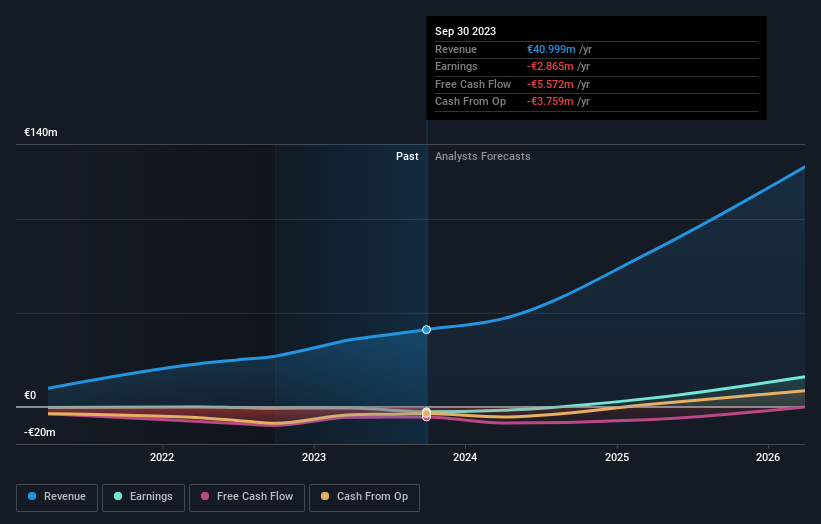- France
- /
- Construction
- /
- ENXTPA:ALESE
Following recent decline, Entech SA's (EPA:ALESE) top shareholder CEO Christopher Franquet sees holdings value drop by 12%

Key Insights
- Significant insider control over Entech implies vested interests in company growth
- 52% of the company is held by a single shareholder (Christopher Franquet)
- Institutional ownership in Entech is 13%
If you want to know who really controls Entech SA (EPA:ALESE), then you'll have to look at the makeup of its share registry. The group holding the most number of shares in the company, around 64% to be precise, is individual insiders. In other words, the group stands to gain the most (or lose the most) from their investment into the company.
As market cap fell to €103m last week, insiders would have faced the highest losses than any other shareholder groups of the company.
In the chart below, we zoom in on the different ownership groups of Entech.
See our latest analysis for Entech

What Does The Institutional Ownership Tell Us About Entech?
Institutional investors commonly compare their own returns to the returns of a commonly followed index. So they generally do consider buying larger companies that are included in the relevant benchmark index.
As you can see, institutional investors have a fair amount of stake in Entech. This implies the analysts working for those institutions have looked at the stock and they like it. But just like anyone else, they could be wrong. When multiple institutions own a stock, there's always a risk that they are in a 'crowded trade'. When such a trade goes wrong, multiple parties may compete to sell stock fast. This risk is higher in a company without a history of growth. You can see Entech's historic earnings and revenue below, but keep in mind there's always more to the story.

Entech is not owned by hedge funds. Looking at our data, we can see that the largest shareholder is the CEO Christopher Franquet with 52% of shares outstanding. This implies that they possess majority interests and have significant control over the company. Investors usually consider it a good sign when the company leadership has such a significant stake, as this is widely perceived to increase the chance that the management will act in the best interests of the company. With 13% and 5.3% of the shares outstanding respectively, Laurent Meyer and Natixis Investment Managers International are the second and third largest shareholders. Interestingly, the second-largest shareholder, Laurent Meyer is also Senior Key Executive, again, pointing towards strong insider ownership amongst the company's top shareholders.
While studying institutional ownership for a company can add value to your research, it is also a good practice to research analyst recommendations to get a deeper understand of a stock's expected performance. There is a little analyst coverage of the stock, but not much. So there is room for it to gain more coverage.
Insider Ownership Of Entech
The definition of an insider can differ slightly between different countries, but members of the board of directors always count. The company management answer to the board and the latter should represent the interests of shareholders. Notably, sometimes top-level managers are on the board themselves.
I generally consider insider ownership to be a good thing. However, on some occasions it makes it more difficult for other shareholders to hold the board accountable for decisions.
Our most recent data indicates that insiders own the majority of Entech SA. This means they can collectively make decisions for the company. Given it has a market cap of €103m, that means they have €66m worth of shares. Most would argue this is a positive, showing strong alignment with shareholders. You can click here to see if those insiders have been buying or selling.
General Public Ownership
The general public-- including retail investors -- own 22% stake in the company, and hence can't easily be ignored. This size of ownership, while considerable, may not be enough to change company policy if the decision is not in sync with other large shareholders.
Next Steps:
While it is well worth considering the different groups that own a company, there are other factors that are even more important. For example, we've discovered 2 warning signs for Entech (1 can't be ignored!) that you should be aware of before investing here.
If you are like me, you may want to think about whether this company will grow or shrink. Luckily, you can check this free report showing analyst forecasts for its future.
NB: Figures in this article are calculated using data from the last twelve months, which refer to the 12-month period ending on the last date of the month the financial statement is dated. This may not be consistent with full year annual report figures.
Valuation is complex, but we're here to simplify it.
Discover if Entech might be undervalued or overvalued with our detailed analysis, featuring fair value estimates, potential risks, dividends, insider trades, and its financial condition.
Access Free AnalysisHave feedback on this article? Concerned about the content? Get in touch with us directly. Alternatively, email editorial-team (at) simplywallst.com.
This article by Simply Wall St is general in nature. We provide commentary based on historical data and analyst forecasts only using an unbiased methodology and our articles are not intended to be financial advice. It does not constitute a recommendation to buy or sell any stock, and does not take account of your objectives, or your financial situation. We aim to bring you long-term focused analysis driven by fundamental data. Note that our analysis may not factor in the latest price-sensitive company announcements or qualitative material. Simply Wall St has no position in any stocks mentioned.
About ENXTPA:ALESE
Entech
Engages in the storage, conversion, and management of renewable energies in France and internationally.
Exceptional growth potential with mediocre balance sheet.


